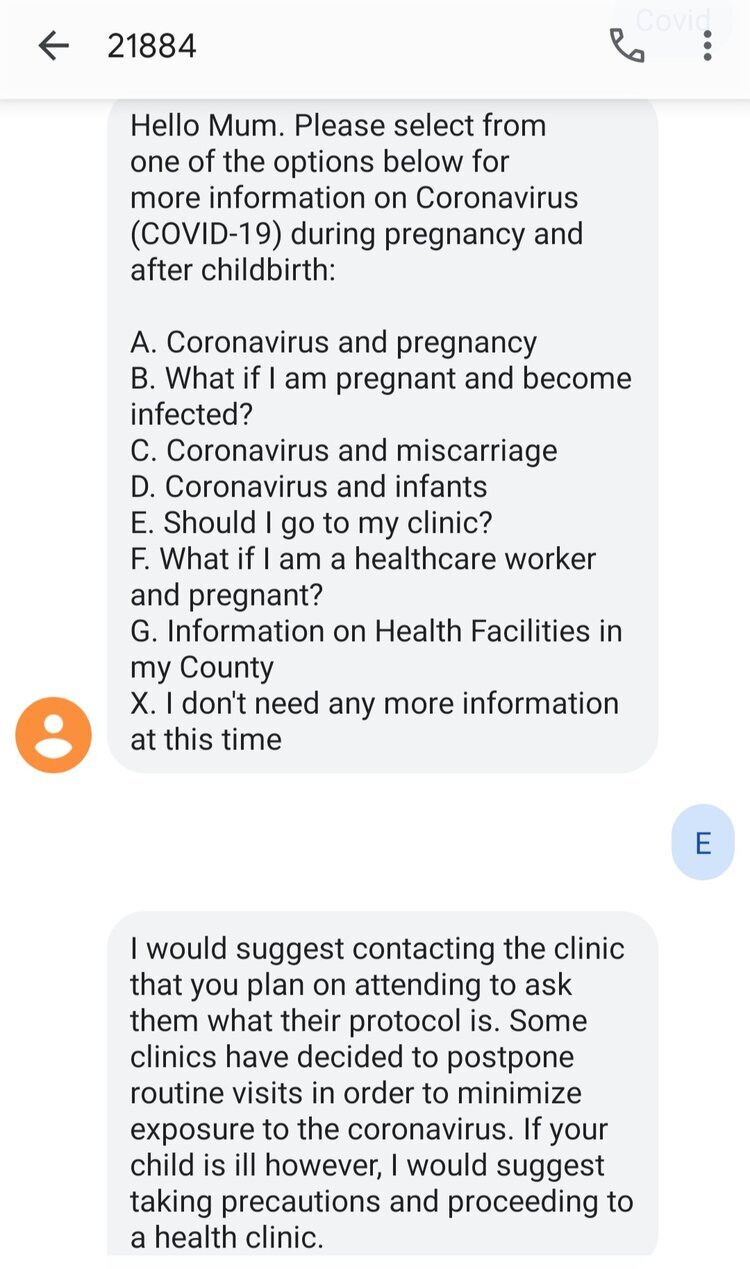During the 2014-2016 Ebola outbreak in West Africa, one tragic consequence of the focus on controlling the spread of Ebola was the indirect impact on maternal and neonatal health outcomes: there were significant declines in maternal care-seeking and a corresponding increase in facility-based maternal deaths and stillbirths.1 As Kenya joins the list of countries implementing tough measures to prevent the spread of COVID-19, the lessons learned from Ebola have inspired us to think critically about our role in the face of this outbreak: remaining focused on supporting government hospitals to deliver high quality, essential services for mothers and babies during this incredibly challenging period.
As we continue to navigate this new context, we are leveraging the tools at our disposal to answer two important questions:
- How can we leverage our digital health platform to ensure that pregnant women and new mothers have the information they need to seek care at the right time and place, and are not getting left behind during the COVID-19 outbreak?
- How can we more effectively support our network of nurse mentors and our county partners to continue providing life-saving maternal and newborn care alongside their outbreak responses?

Using mHealth approaches to ensure pregnant women and new mothers have the right COVID-specific information
PROMPTS, our two-way digital health support platform for expecting and new mums, reaches over 120,000 women across the country, and over the last two weeks, questions from anxious mothers have been growing every day:
- How shall we and our babies survive CoronaVirus?
- Should I take my baby to the clinic during CoronaVirus?
- I am afraid to deliver my baby at the hospital because of CoronaVirus, is it okay if I deliver at home?
Mums are seeking information so that they can make the best health decisions for themselves and their babies. This highlights an important role for maternal and newborn health organizations to adapt to: providing accurate information around the effects of COVID-19 on pregnancy and babies, and how to seek care during this time.
Our Help Desk agents are actively using information as it becomes globally and locally available to best equip themselves to support our users. We are also adding capacity on our digital health platform with fresh COVID-19 content and new tools. Our tech team has created a COVID-19 informational Bot on SMS and Telegram to provide instant responses to frequently asked pregnancy and postpartum related questions, and county-specific health facility updates. We would be happy to share this tool with other organizations in the space.
Supporting government nurses and health systems to maintain essential maternal and newborn care services.
We are supporting our network of nurse mentors – 111 government hospital practitioners in 150+ facilities – and five county government partners by developing resource-efficient tools that can help providers in the maternity ward:
- Tracking changes in MNH service delivery: We are maintaining a log of closures and service hour changes, and sharing this information with PROMPTS users to know when and where to seek care. As facilities are implementing localized responses, we are also coordinating with them to support resolutions for any resulting service delivery disruptions.
- Supporting providers with up-to-date and accurate information: The nurse mentorship team is also receiving increasing requests from front line nurses for more information. As a result, they have developed and shared a COVID-19 CME for training use at partner facilities, including evidence on international and national guidelines for antenatal, intrapartum and postpartum care during the COVID-19 crisis.
- Sharing best practices taking place across counties: County health managers are leveraging our presence in multiple counties to act as a liaison and connector between county coordinators, to share their best practices and learn from each other.
- Supporting a transition to remote work using digital communications tools: All Jacaranda-supported government meetings are now conducted using teleconference tools, and we have also supported our government partners to learn and deploy communication tools that can help them manage their work and teams remotely.
Looking Ahead
As we continue to monitor and adapt to the unfolding situation, we are also looking to engage and learn from others who are doing the same. We are connected to front line healthcare experiences and collecting data that can help to define conversations around how the global health community can participate in the response. We can honor the lessons learnt from the Ebola outbreak by monitoring the situation in real-time, developing and sharing best practices, and investing in the smartest and most efficient approaches that allow us to effectively respond to COVID-19 without ignoring essential health services.
1. Jones et al, ‘Women and babies are dying but not of Ebola’: the effect of the Ebola virus epidemic on the availability, uptake and outcomes of maternal and newborn health services in Sierra Leone, BMJ Global Health 2016

